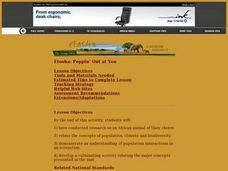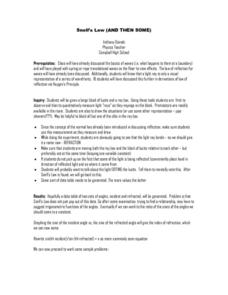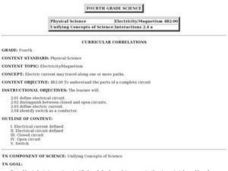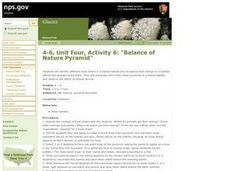Curated OER
The Geometry of Real Images
In this math worksheet, students read the examples for using the techniques of mathematical modeling. They draw the angles in order to simulate the reflection of light while using a concave mirror.
Curated OER
How Electric Current Produces Energy
Fifth graders are introduced to the concept of electric currents. In groups, they develop their own game board to test different circuits to determine if they are complete. They record their observations of the energy transfer between...
Curated OER
Etosha: Poppin' Out at You
Tenth graders research an African animal of their choice and relate the concepts of population, climate and biodiversity to their animal. They examine how population interacts in an ecosystem.
Curated OER
Where Are The Dinosaurs?
Students examine the concept of extinction in relationship to the dinosaurs. In this elementary science lesson students become familiar with dinosaurs and that they are extinct. Students differentiate between different types of dinosaurs.
Curated OER
Linear Motion
In this fantastic physics and math lesson, student pairs create a ramp that will transport a rolling marble in order to learn about linear motion. Students use cardboard, straws, toothpicks, marshmallows, and paper clips in order to make...
American Institute of Architects
Architecture: It's Elementary!—First Grade
Build an interest and appreciation for architecture in your young learners with this fun 10-lesson art unit. Engaging children in using their five senses, the class first observes the environment around them, paying special attention to...
Center for Technology in Teaching and Learning
CSI: The Experience - Family Forensics
Forensic scientists depend on their observation skills to analyze evidence down to the molecular level. Middle and high schoolers practice making observations and predictions with a series of crime scene activities, which includes a...
Exploratorium
Falling Feather
Whether or not Galileo actually dropped balls from the Leaning Tower of Pisa, this demonstration will solidly demonstrate that objects are accelerated at the same rate, regardless of mass. You will, however, need a vacuum pump and a few...
Nuffield Foundation
Controlling Body Mass
Many variables impact your body mass, not just diet and exercise. Scholars collect and study data about body mass to better understand the complexity of a sensitive topic. They learn about leptin deficiency, the hypothalamus, and more.
Curated OER
Energy Defined
Fourth graders complete activities to study the sources of energy and forms. In this energy lesson, 4th graders discuss the origin of energy and define it. Students participate in several experiments to further study energy including a...
Curated OER
Soccer Dribbling
Seventh graders participate in a soccer activity to practice moving the ball around the field. In this soccer dribbling lesson, 7th graders students try to prevent their opposing students from completing the filed exercise by kicking...
Curated OER
Running
Students participate in team activities and drills to practice running types and techniques such as high knee, skip running, back kick, big stride, etc... They participate in a 50 meter dash, relay race, and agility race.
Curated OER
The Case of the Mysterious Red Light
Students investigate why some sunrises and sunsets are unusually bright red.
Curated OER
Colored Shadows
Young scholars explore how different colors are seen through the cone cells in our eyes. In this light lesson students complete a lab activity with light and record their observations.
Curated OER
Conductors, Insulators, and Semiconductors
Middle schoolers will investigate the differences in conductivity of materials, design a variety of complete circuits, and observe the differences between the manner in which light is produced in an incandescent light bulb and an LED.
Curated OER
Snell's Law (And Then Some)
Students conduct an experiment to test Snell's Law using a block of lucite and a ray box. They measure the light rays as they impinge upon the block. Students are also asked to draw the situation of the lab or create a model of the...
Curated OER
What Color is Chlorophyll?
Students observe the interactions of chlorophyll and light. They develop and form their own testable hypotheses. Students predict the color of chlorophyll in various types of plants.
Curated OER
Paths of Electrical Currents
Fourth graders examine the paths that electrical currents travel. They create a current of electricity using flashlights, bulbs, batteries, wires and tape. They determine how to create a closed circuit that will light the bulb. They...
Curated OER
Solar Kit Lesson #1 Solar Cell Inquiry
Students use a selection of solar panels, lamps, motors, and an AA battery to get as many motors or lights to operate as they can in an allotted time period. For each successful arrangement, they draw a diagram of their setup, label the...
Curated OER
Exploring Magnetism in Solar Flares
Students apply concepts of magnetism to help them understand the production of solar flares. In this solar flare lesson, students complete activities and graphic organizers to help them learn about magnetic fields on the surface of the...
Curated OER
Balance of Nature Pyramid
Students study the concept of food chains and create a physical forest food chain pyramid. In this balance of nature pyramid instructional activity, students identify the ingredients needed on each level of the pyramid then make...
University of Arizona
The Exotic Vacation
Students explain the concepts and vocabulary of Earth's rotation. They plan imaginary vacations based on the seasons in different locations. This is a very creative lesson plan, which students enjoy.
Curated OER
Outdoor Survival
Students are introduced to basic outdoor survival concepts. They identify the seven basic needs for survival. Students describe the symptoms and treatment for frostbite and hypothermia. They compare and contrast the value of different...
Curated OER
Walk Your Dog
Students practice dribbling using a pillo polo stick. In this dribbling lesson, students demonstrate the proper grip and technique of dribbling with a polo stick. Students should have been introduced to prior concepts, such as striking.

























